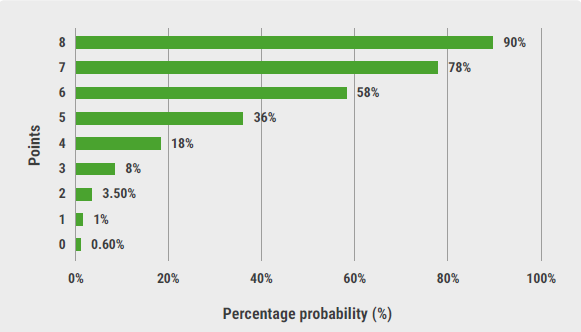 An ongoing open-label, randomised phase 3 trial (NCT04736706) will determine the efficacy of the triplet combinations of belzutifan, lenvatinib, and pembrolizumab or lenvatinib, pembrolizumab, and quavonlimab versus lenvatinib and pembrolizumab alone, for the treatment of advanced clear cell renal cell carcinoma (ccRCC), according to a presentation at ASCO’s Genitourinary Cancers Symposium (GU22), held in San Francisco, CA from 17-19 February, 2022 [1]. Medicom attended GU22 and interviewed lead study author Prof. Toni Choueiri (Dana-Farber Cancer Institute, Harvard Medical School, MA, USA).
An ongoing open-label, randomised phase 3 trial (NCT04736706) will determine the efficacy of the triplet combinations of belzutifan, lenvatinib, and pembrolizumab or lenvatinib, pembrolizumab, and quavonlimab versus lenvatinib and pembrolizumab alone, for the treatment of advanced clear cell renal cell carcinoma (ccRCC), according to a presentation at ASCO’s Genitourinary Cancers Symposium (GU22), held in San Francisco, CA from 17-19 February, 2022 [1]. Medicom attended GU22 and interviewed lead study author Prof. Toni Choueiri (Dana-Farber Cancer Institute, Harvard Medical School, MA, USA).Medicom: Doublet combinations are the current standard of care for ccRCC, however, most patients still experience disease progression. Will adding a third agent lead to improvement in outcomes?
The study will compare two novel combination regimens to an established therapy for advanced clear cell renal cell carcinoma (ccRCC) [1]. The new immunoglobulin G1 (IgG1) anti-cytotoxic T-lymphocyte-associated protein 4 (anti-CTLA-4) monoclonal antibody quavonlimab will be administered in combination with pembrolizumab [anti-programmed cell death protein 1 (PD-1)], and the addition of hypoxia-inducible factor 2 (HIF2) inhibitor bezutifan will also be investigated.
In total, 1,431 patients with advanced ccRCC will be randomized 1:1:1: to 3 trial arms, namely:
-Arm A: 400 mg pembrolizumab (intravenous, every 6 weeks) plus 120 mg belzutifan (oral, once daily), and 20mg lenvatinib (oral, once daily)
-Arm B: MK-1308A (400mg pembrolizumab with 25mg quavonlimab; intravenous, every 6 weeks) plus lenvatinib, or
-Arm C: pembrolizumab plus lenvatinib.
The rationale for this combination is based on the phase 3 KEYNOTE-581/CLEAR study (NCT02811861), which showed antitumour activity of a pembrolizumab plus lenvatinib first-line combination therapy in patients with advanced ccRCC [2]. Furthermore, belzutifan and MK-1308A, a coformulation of pembrolizumab and quavonlimab, have demonstrated antitumour activity in ccRCC and non-small cell lung cancer, respectively. This evidence provides a rationale for adding belzutifan or quavonlimab to a backbone of pembrolizumab and lenvatinib in the first-line treatment of patients with advanced ccRCC. The primary endpoints of the current study are progression-free survival and overall survival, comparing arm A or B with arm C.
Medicom interviewed Prof. Choueiri in San Francisco to discuss the details and expectations of this trial.
“Here during GU22, we had the chance to present a 6-months update, so more events for KEYNOTE-564. KEYNOTE-564 was presented during the plenary session of ASCO 2021 and it was the first immunotherapy after almost 3 decades of trying to show that adjuvant immunotherapy does have a place in patients at risk for recurrence with renal cell cancer. The disease-free survival has a ratio of 0.68, or a 32% decrease in the risk of death or recurrence. Now with 6 more months, the disease-free survival and the overall survival hazard ratio remains strong and if anything, they got tighter. We don't have a statistically significant overall survival, despite the confidence interval, despite the hazard ratio of 0.52, because we only have 33% of events. We did not have any new safety signals with pembrolizumab with this new update, so the adjuvant use of pembrolizumab appears to be solid.
“So building on that, we are looking at a number of combinations as well. This 3 arm study, we call it 012, builds on the current standards. The current standard is not sunitinib anymore, but doublet regimens, and here the doublet is pembrolizumab and lenvatinib. Again, that combination beats sunitinib hands down, with regard to response rate, PFS, OS, CR, you name it.
“We're going to have 2 experimental arms in this trial: pembrolizumab/lenvatinib and then adding a CTLA-4 inhibitor, quavonlimab. The renal cell carcinoma community knows our experience with ipilimumab that CTLA-4 inhibition is an active target in renal cell cancer, but the safety burden with ipilimumab can make it hard for some patients. The second arm is going to be with pembrolizumab and lenvatinib, but adding the HIF2 inhibitor belzutifan, which as a single agent showed activity in refractory renal cell cancer patients.
“The study is open to accrual. We have it opened at our center, but it is an international study and hopefully, hopefully it will usher in the era now of triplets in renal cell cancer. But when you have triplets, you have to look at the cost, you have to look at toxicity, you have to look at the magnitude of benefit. When you add the drugs, perhaps a response rate that is not durable is not important, perhaps you go directly to look at overall survival. Let's see, at least I think we are now in a very, very comfortable and full of hope era in renal cell cancer.
“You know, when we use belzutifan as a single agent, the side effects are much different than tyrosine kinase inhibitors. We don't see the diarrhoea, the fatigue, the hypertension. However, there was anaemia, that could be dealt with easily with erythropoietin-stimulating agent or transfusion. Anaemia is considered an on-target effect because the decrease of erythropoietin is downstream of HIF2 inhibition. The other side effect that happened was hypoxia. It was uncommon, but it plays into the pathophysiology of HIF2 in the lung. Primarily we have seen hypoxia in heavily pretreated patients with underlying comorbidities, especially affecting the lungs, such as prior infection, et cetera, so they have a limited lung capacity in terms of reserve. So the patients are watched closely with pulse oximeters. We continue to enroll patients on this study.”
- Choueiri TK, et al. Phase 3 study of first-line treatment with pembrolizumab + belzutifan + Lenvatinib or pembrolizumab/quavonlimab + Lenvatinib versus pembrolizumab + Lenvatinib for advanced renal cell carcinoma (RCC). Abstract TPS399, ASCO-GU 2022, 17-19 February.
- Motzer R, et al. NEJM. 2021;384:1289-1300
Posted on
Previous Article
« Model predicts recurrence after eradication of early Barrett’s neoplasia Next Article
Changes in genitourinary cancer management during the pandemic: findings and implications »
« Model predicts recurrence after eradication of early Barrett’s neoplasia Next Article
Changes in genitourinary cancer management during the pandemic: findings and implications »
Related Articles


June 26, 2023
ASCO 2023 Highlights Podcast
© 2024 Medicom Medical Publishers. All rights reserved. Terms and Conditions | Privacy Policy

